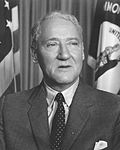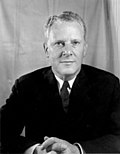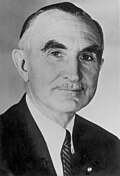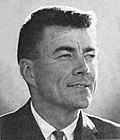Senate
| Senator | Party (at opposition) | State | Term (at opposition) | Ref. | |||
|---|---|---|---|---|---|---|---|
| Start | End | ||||||
 | Frank Church | Democratic | Idaho | 3 January 1957 | 3 January 1981 | [1] | |
 | John Sherman Cooper | Republican | Kentucky | 7 November 1956 | 3 January 1973 | [2] | |
 | J. William Fulbright | Democratic | Arkansas | 3 January 1945 | 31 December 1974 | [3] | |
 | Albert Gore Sr. | Democratic | Tennessee | 3 January 1953 | 3 January 1971 | [4] | |
 | Mike Gravel | Democratic | Alaska | 3 January 1969 | 3 January 1981 | [5] | |
 | Ernest Gruening | Democratic | Alaska | 3 January 1959 | 3 January 1969 | [6] | |
 | Vance Hartke | Democratic | Indiana | 3 January 1959 | 3 January 1977 | [7] | |
 | Mark Hatfield | Republican | Oregon | 3 January 1967 | 3 January 1997 | [8] | |
 | Jacob Javits | Republican | New York | 3 January 1957 | 3 January 1981 | [9] | |
 | Robert F. Kennedy | Democratic | New York | 3 January 1965 | 6 June 1968 | [10] | |
 | Mike Mansfield | Democratic | Montana | 3 January 1953 | 3 January 1977 | [11] | |
 | Charles Mathias | Republican | Maryland | 3 January 1969 | 3 January 1987 | [12] | |
 | Eugene McCarthy | Democratic-Farmer-Labor | Minnesota | 3 January 1959 | 3 January 1971 | [13] | |
 | George McGovern | Democratic | South Dakota | 3 January 1963 | 3 January 1981 | [14] | |
 | Wayne Morse | Democratic | Oregon | 3 January 1945 | 3 January 1969 | [15] | |
 | William Proxmire | Democratic | Wisconsin | 28 August 1957 | 3 January 1989 | [16] | |


















